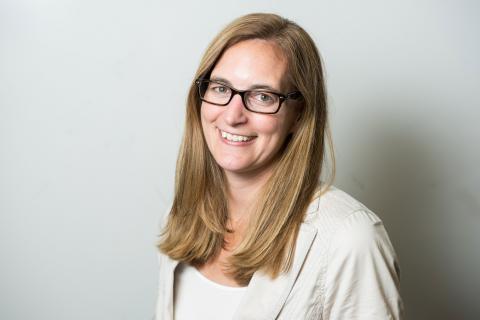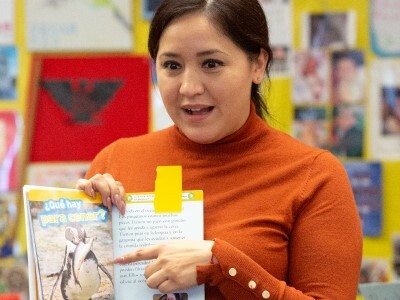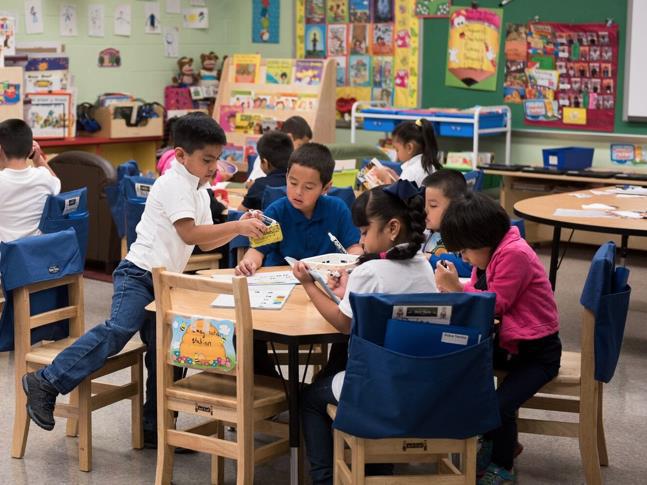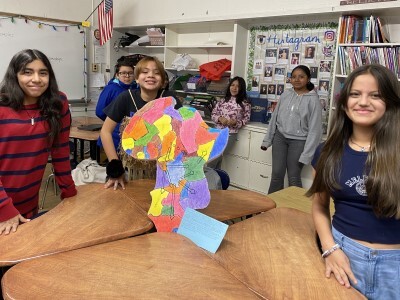5 Next Gen Professional Learning Practices Used by Schools Today
Topics
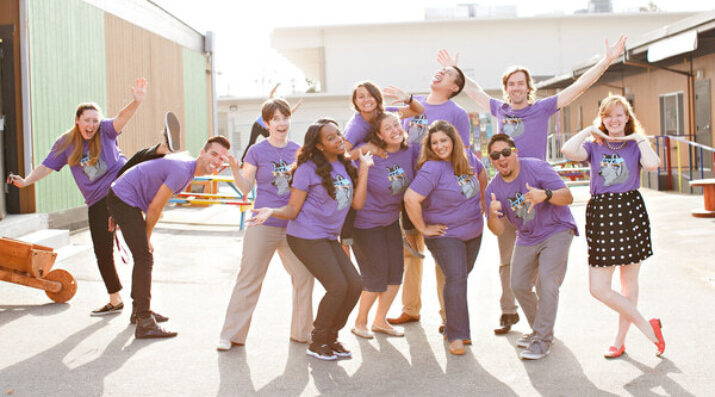
Educators are the lead learners in schools. If they are to enable powerful, authentic, deep learning among their students, they need to live that kind of learning and professional culture themselves. When everyone is part of that experiential through-line, that’s when next generation learning thrives.
We asked leading educators to tell us how schools and districts can best enable their teachers to work successfully in personalized, next gen learning environments.
At NGLC, we believe the only way to create lasting change in K–12 education is when educators lead the work. That’s why NGLC and its Next Gen Professional Learning Project partners asked leading educators to guide the field on this question:
How can schools and districts moving toward personalized, next gen learning for students best enable their teachers to work successfully in these richer, deeper learning environments?
Current research mostly focuses on specific needs for teachers and what teachers should know, but we wanted to gather current practices across schools and districts to understand the landscape better. Therefore, this month we conducted an exploratory survey and collected over 200 responses from educators representing individual schools (41%), school districts (39%), charter organizations (10%), and a number of other organizations (like state agencies, non-profits working with districts, and operators of school networks; 9%).
As results come in, we want to share some early observations about the innovative professional learning practices used by participants. These are early observations—a more formal report later this year will provide the official results and analysis.
Next Gen Professional Learning Practices
We asked educators to tell us the extent to which they use certain approaches to professional learning. As shown in the chart, among the practices that are most in use, right now, we find the following:
Social-based: Professional learning occurs through social interactions with other educators, such as virtual or in-person personal learning networks, inquiry teams, peer observations, and other social networks
Measures impact on learning: Professional learning focuses on measures of impact on student learning
Practice-based: Professional learning involves authentic experience and direct application to classroom practice
Skills for personalizing learning: Professional learning teaches skills to enable personalized learning with students
Educator-driven: Educator drives the learning
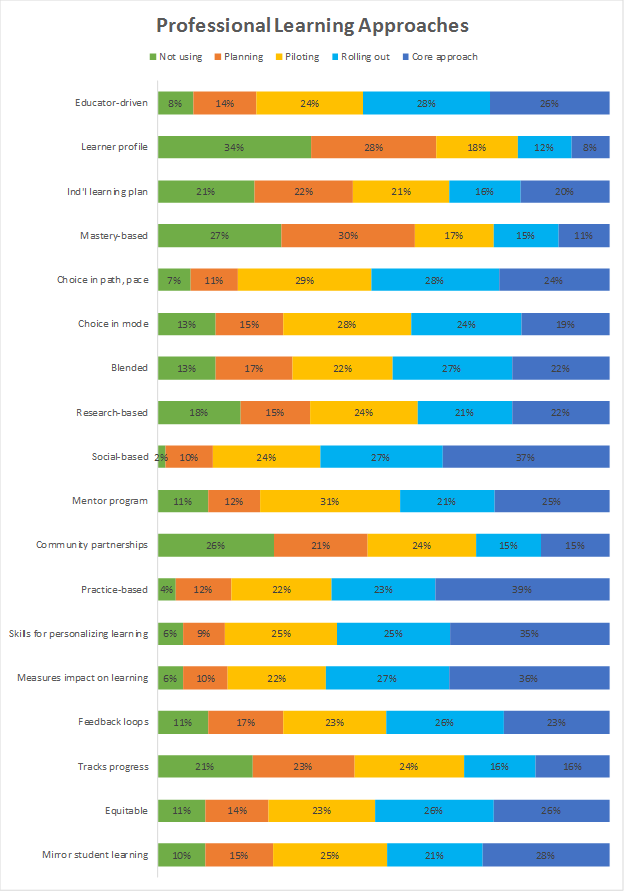
Only one-quarter of participants said all of their educators are participating in next gen professional learning, as they described it in the chart above. Another 28% said they are reaching more than half of their educators.
It’s also interesting to look at which professional learning practices are not currently used by participants. One-fifth to one-third of participants have no immediate plans to use learner profiles, mastery-based learning (where educators demonstrate proficiency in specific competencies), community partnerships and externships, or professional learning that tracks educator progress and growth over time. The survey doesn't directly ask why this might be the case, nor does it capture whether participants might have plans further in the future. (We hope to unpack this some more, though; see "What It All Means" below.)
Motivations for Next Gen Professional Learning
We asked participants what spurred their organizations to adopt the practices they identified, and we noticed a few common themes in the responses. One was a desire, and for some an obligation, to mirror their learning model for students:
“While all of the above have been central to our approach to professional development, the last one [mirror student learning] is the one that drives the rest.”
“If we are asking our teachers to provide a personalized learning experience for our students, we must provide a personalized professional development experience that models that.”
Another common response was recognizing that everyone is a learner, even adults.
“It is the best way for students of all ages to learn. Why not practice what we preach? Professional Learning for adults is notoriously out of line with best practices and that was not an option for us. We must model and practice what we do with students if we believe it to truly be the best way to learn.”
Some educators reported that these innovative approaches were simply part of their philosophy with phrases like, “It’s who we are” and “It’s in our DNA.” Others, however, saw it as part of their transition to next gen learning, where taking a new approach to professional learning would help shift their student learning model. And still others admitted that a next gen approach to professional learning wasn’t a focus for them, even if they were personalizing learning for students:
“We really focus more on the individualization of student learning more than we are on the individualization of teacher learning. If money allowed us to be more individual, it would be great; but we have to decide on PL [professional learning] based on overall needs of the school and specific subject areas usually.”
Survey Participants
So who participated in this survey and what slice of the education ecosystem do they represent?
Our sample was not intended to be representative. We wanted to hear from educators in organizations that were adopting next gen learning models, to varying degrees, and we wanted to hear from educators in organizations with strong professional learning models. This included NGLC grantees, NGLC Regional Fund grantees, and Assessment for Learning Project grantees. We also secured the help of partners like The Learning Accelerator, Digital Promise, Race to the Top - District, Springpoint, School Retool, and others.
The invitation to participate was targeted to school and district/CMO leaders as well as individuals who were responsible for professional learning in their organization. Nearly all of them were involved with professional learning in some capacity, whether designing (86%) or delivering (86%) professional learning or serving as a trainer, mentor, or coach (62%).
Participants represented district and public charter schools. A small number of private and independent schools were invited to participate as well. The grades served ranged from preschool through high school. The percent of students qualified for free/reduced price lunch also varied. The use of next gen learning models in the participants' schools and districts varied as well. The most common student learning innovations currently in use by participants included personalized learning, an innovative staffing model, an explicit focus on social-emotional learning, community partnerships, and blended learning.
What It All Means
That’s what we’re going to figure out next. Our goal is to understand the landscape in order to know how we can best support educators. We’ll continue to dig into these items as well as the information participants shared about strategies for growth and the tools and providers available to them. We’re also in the midst of a series of interviews and we are listening intently to what educators are doing, what they need, and what they want when it comes to professional learning. The best is yet to come!

